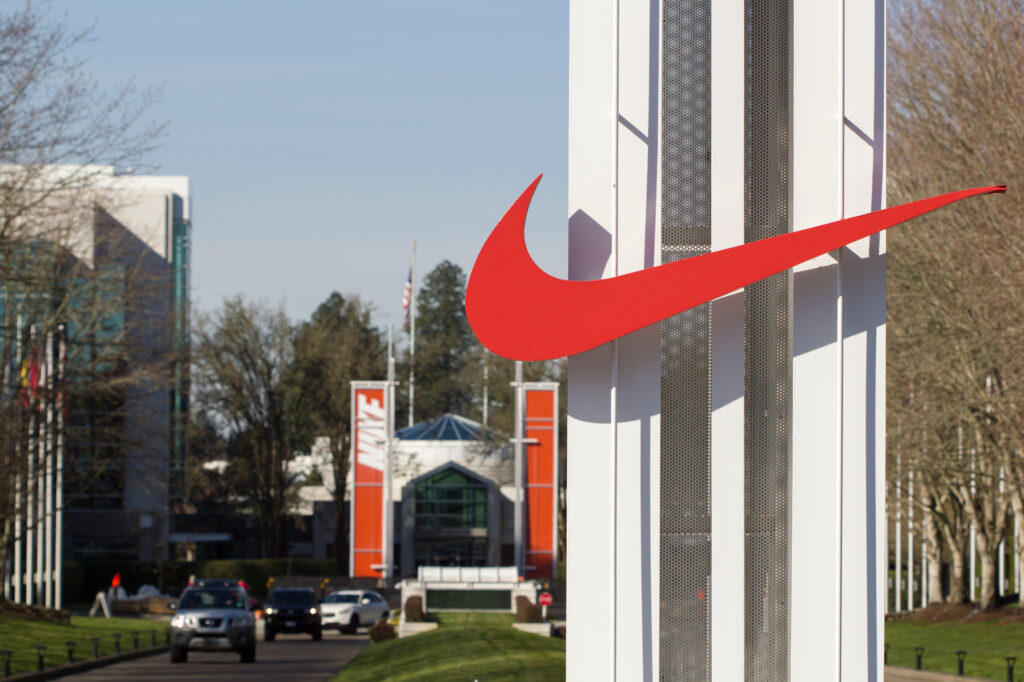

Features
Corporate Social Responsibility
Ethics
Canada’s corporate ethics czar launches forced labour probes into Nike, Dynasty Gold in China
 Nike's world headquarters in Beaverton, Oregon. Photo: Adobe Stock
Nike's world headquarters in Beaverton, Oregon. Photo: Adobe Stock By Dylan Robertson
Ottawa’s corporate-ethics watchdog has announced investigations into a gold-mining corporation and the Canadian branch of Nike for possible forced labour by China’s Uyghur minority in their supply chains
“These are very serious issues that have been brought to our attention,” Sheri Meyerhoffer, who is the Canadian Ombudsperson for Responsible Enterprise, told reporters Tuesday.
“Canadian companies are expected to respect Canadian standards for human rights and environmental protection when they work outside of Canada.”
The probes are the first investigations her office has launched since it was created by the Liberals in 2018, after sustained criticism by advocates, MPs and Meyerhoffer herself that Prime Minister Justin Trudeau’s government did not give the ombudsperson enough teeth to hold companies to account.
In one assessment report, Meyerhoffer accuses Nike Canada Corp. of not sufficiently answering claims that it is sourcing products created through slave labour.
Her report says Nike rejected initial mediation, arguing its global parent company had already disproven allegations by the Australian Strategic Policy Institute, a branch of the Australian government, about specific suppliers with whom Nike says it no longer has ties.
Meyerhoffer said Nike hasn’t weeded out the possibility that it has bought products through a supplier in Vietnam that could be using cotton originating downstream from slave labour in China’s Xinjiang region.
“The complex nature of garment supply chains may warrant investigation,” Meyerhoffer’s report argues, particularly because Nike “has provided limited detail about the nature and scope of its” traceability protocols, such as how it tracks the origin of fibres used in its products.
Meyerhoffer’s other report accuses Dynasty Gold Corp. of allowing forced labour to occur at its gold mine in the Hatu district bordering Kazakhstan, close to what China has called “detention” centres or “re-education” camps.
China insists those centres are meant to weed out Islamic radicalization after several deadly domestic attacks.
But the United Nations found in mid-2022 that China had committed “serious human rights violations” against Uyghurs and other Muslim communities that “may constitute international crimes, in particular crimes against humanity.”
Meyerhoffer’s report says that after months of attempts by her office to contact someone at the Vancouver-based company, the firm eventually argued that it does not have control over that mine.
But Meyerhoffer noted this is contradicted by statements in corporate documents and press releases.
The firm “appears to have deliberately avoided participating in and co-operating with the (office’s) dispute resolution process without providing any explanation,” the report reads.
The two probes stem from complaints brought by a coalition of two dozen human-rights groups, which Meyerhoffer noted were open to a resolution that wouldn’t have the companies publicly named.
The Canadian Press has reached out to both companies and the Chinese embassy in Ottawa for comment.
Meyerhoffer said she plans to publish 11 more reports in the coming weeks on cases involving Uyghur people.
The ombudsperson has also been assessing for months whether to investigate alleged violations of the right to a living wage for workers at Canadian-controlled garment factories in Bangladesh, and the right of assembly for garment workers in Honduras.
The Liberals promised to create the ombudsperson role in the 2015 campaign, replacing a post Stephen Harper’s Conservative government created in 2009 that was restricted to advising the extractive sector and monitoring its corporate policies.
They enacted the new office in 2018, allowing it to probe garment industries as well as the mining,oil and gas sectors.
Meyerhoffer, a lawyer whose career focused on international development as well as Alberta’s oil sector, was appointed a year later. But she only started accepting complaints in 2021 and had not launched any formal investigations until Tuesday.
The office monitors the roles of any entity controlled by a Canadian firm directly or indirectly, which includes foreign suppliers and contractors who only work for a company based in Canada.
It has conducted reviews of issues abroad, such as an analysis of 10 Canadian garment companies operating outside the country. It found few tracked supply chains well enough to detect child labour, since many only monitor their systems in steps that follow the production of raw materials.
The office has long faced a debate over how much power Meyerhoffer needs to do more rigorous work.
Advocacy groups such as the Canadian Network on Corporate Accountability have long called for the legal right to compel documents and witnesses from companies. But some academics have argued that a more co-operative approach with industry might be likelier to foster change.
An external legal review commissioned by Ottawa sided with advocates, arguing Meyerhoffer cannot be effective without a temporary regulatory order and/or new legislation to be able to force disclosures from corporations.
Meyerhoffer herself told media in November 2019 that she’d be asking the Liberals for such powers, and she was tight-lipped Tuesday as to whether the Trudeau government had responded to that request.
She noted that many organizations have weighed in on how to best design the office, which she said is unique in the world.
And Meyerhoffer told MPs in February she was aware human-rights groups were advising against filing complaints with her office and going straight to court, in part out of fear of retribution from companies that don’t have to co-operate with her team.
Opposition parties have been critical of Ottawa for barely seizing any shipments of goods produced through forced labour. The U.S., by comparison, seized 1,530 shipments last year and ultimately prevented 208 of them from entering the country.
Advocacy groups have warned that cotton and tomato goods from China may be products of Uyghur slave labour.
Print this page
